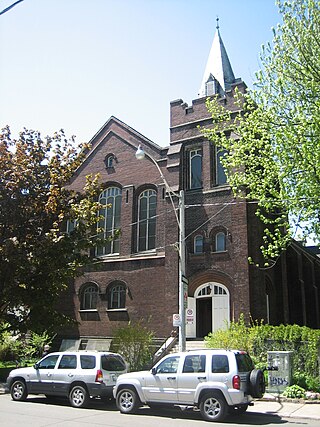Common-law marriage, also known as non-ceremonial marriage, sui iuris marriage, informal marriage, de facto marriage, more uxorio or marriage by habit and repute, is a marriage that results from the parties' agreement to consider themselves married, followed by cohabitation, rather than through a statutorily defined process. Not all jurisdictions permit common law marriage, but will typically respect the validity of such a marriage lawfully entered in another state or country.

Same-sex marriage was progressively introduced in several provinces and territories of Canada by court decisions beginning in 2003 before being legally recognized nationwide with the enactment of the Civil Marriage Act on July 20, 2005. On June 10, 2003, the Court of Appeal for Ontario issued a decision immediately legalizing same-sex marriage in Ontario, thereby becoming the first province where it was legal. The introduction of a federal gender-neutral marriage definition made Canada the fourth country in the world, and the first country outside Europe, to legally recognize same-sex marriage throughout its borders. Before the federal recognition of same-sex marriage, court decisions had already introduced it in eight out of ten provinces and one of three territories, whose residents collectively made up about 90 percent of Canada's population. More than 3,000 same-sex couples had already married in those areas before the Civil Marriage Act was passed. In 2023, polling by Pew Research suggested that more than three-quarters of Canadian residents supported the legal recognition of same-sex marriage. Most legal benefits commonly associated with marriage had been extended to cohabiting same-sex couples since 1999.

Egan v Canada, [1995] 2 SCR 513 was one of a trilogy of equality rights cases published by the Supreme Court of Canada in the second quarter of 1995. It stands today as a landmark Supreme Court case which established that sexual orientation constitutes a prohibited basis of discrimination under section 15 of the Canadian Charter of Rights and Freedoms.

Same-sex marriage has been legal in Yukon since July 14, 2004, immediately following a ruling from the Supreme Court of Yukon. This made the territory the fourth jurisdiction in Canada, and the seventh in the world after the Netherlands, Belgium, Ontario, British Columbia, Quebec and Massachusetts, to legalise same-sex marriage. Yukon was the first of Canada's three territories to legalise same-sex marriage, and the only one to do so before the federal legalisation of same-sex marriage in July 2005 by the Parliament of Canada.

Same-sex marriage has been unambiguously legal in Ontario since June 10, 2003. The first legal same-sex marriages performed in Ontario were of Kevin Bourassa to Joe Varnell, and Elaine Vautour to Anne Vautour, by Reverend Brent Hawkes on January 14, 2001. The legality of the marriages was questioned and they were not registered until after June 10, 2003, when the Court of Appeal for Ontario in Halpern v Canada (AG) upheld a lower court ruling which declared that defining marriage in heterosexual-only terms violated the Canadian Charter of Rights and Freedoms.

Same-sex marriage has been legal in British Columbia since July 8, 2003, after a series of court rulings in Barbeau v. British Columbia which ultimately landed in favour of same-sex couples seeking marriage licences. This made British Columbia the second province in Canada, the second jurisdiction in North America and the fourth in the world, after the Netherlands, Belgium and Ontario, to legalise same-sex marriage.

Same-sex marriage has been legal in Nova Scotia since September 24, 2004 when the province began issuing marriage licences to same-sex couples immediately following a court ruling from the Nova Scotia Supreme Court. Nova Scotia was the sixth jurisdiction in Canada and the ninth in the world, after the Netherlands, Belgium, Ontario, British Columbia, Quebec, Massachusetts, Yukon and Manitoba, to legalise same-sex marriage.

Same-sex marriage has been legal in Saskatchewan since November 5, 2004 as a result of a decision of the Family Law Division of the Saskatchewan Court of Queen's Bench. This decision followed similar cases in six other provinces and territories, and pre-dated by eight months the federal Civil Marriage Act of 2005, which made same-sex marriage available throughout Canada. Later court decisions have dealt with the issue of marriage commissioners who object to performing same-sex marriages on the basis of their religious beliefs.

Same-sex marriage has been legal in New Brunswick since June 23, 2005 in accordance with a ruling from the Court of Queen's Bench of New Brunswick. This decision followed similar cases in eight other provinces and territories, and pre-dated by only one month the federal Civil Marriage Act of 2005, which legalised same-sex marriage throughout Canada. New Brunswick was the ninth jurisdiction in Canada and the twelfth in the world to recognise same-sex marriage.

Reference Re Same-Sex Marriage [2004] 3 S.C.R. 698, 2004 SCC 79, was a reference question to the Supreme Court of Canada regarding the constitutional validity of same-sex marriage in Canada. The ruling was announced December 2004, following arguments made two months prior.
Israel has granted unregistered cohabitation for same-sex couples since 1994, in the form of common-law marriage, a status that until then was only extended to opposite-sex couples. Following lawsuits, same-sex couples enjoy several spousal benefits (1994–1996) and the right of same-sex partners of civil service employees to survivor benefits (1998).

The Metropolitan Community Church of Toronto is a congregation of the worldwide Metropolitan Community Church movement located in Toronto, Ontario, Canada and is a welcoming congregation openly affirming lesbian, gay, bisexual, heterosexual and transgender people. MCC Toronto was instrumental in changing the law on same sex marriage in Ontario, when two same-sex marriage ceremonies performed at the church on January 14, 2001 initiated the process leading to the Halpern v Canada (AG) decision of 2003.
Same-sex marriage is legal in Aruba and Curaçao, two constituent countries of the Kingdom of the Netherlands, in accordance with a ruling from the Supreme Court of the Netherlands issued on 12 July 2024. In September 2021, a lower court in Curaçao ruled that preventing same-sex couples from marrying violates the equality provisions of the Constitution of Curaçao, but left the decision of whether to legalise same-sex marriage up to the Parliament. In December 2022, the Joint Court of Justice of Aruba, Curaçao, Sint Maarten, and of Bonaire, Sint Eustatius and Saba ruled on appeal that Aruba's and Curaçao's same-sex marriage bans were unconstitutional. The court order was set to go into effect on 7 March 2023 if not appealed to the Supreme Court; however, the governments of both Curaçao and Aruba subsequently appealed. On 12 July 2024, the Supreme Court upheld the lower court ruling, effectively legalizing same-sex marriage in Aruba and Curaçao with immediate effect.

Halpern v Canada (AG), [2003] O.J. No. 2268 is a June 10, 2003 decision of the Court of Appeal for Ontario in which the Court found that the common law definition of marriage, which defined marriage as between one man and one woman, violated section 15 of the Canadian Charter of Rights and Freedoms.

The Foundation for Equal Families is a Canadian gay and lesbian rights group founded in 1994 following the failure of Bill 167 in the Legislative Assembly of Ontario. The group's mandate is "Dedicated to achieving recognition and equality for same sex relationships and associated family rights through education and legal action". Meeting this mandate was accomplished by intervening in various precedent-setting legal cases, through representation at various pride parades and most notably in suing the Canadian federal government over failure to amend 58 pieces of federal legislation that were charter-infringing due to the definition of spouse.

Michael Leshner and Michael Stark, also known as The Michaels, were the men who in 2003 entered into the first legal same-sex marriage in Canada. They were consequently named the Canadian Newsmakers of the Year by Time magazine.

The Family Law Act is a statute passed by the Legislature of Ontario in 1986, regulating the rights of spouses and dependants in regard to property, support, inheritance, prenuptial agreements, separation agreements, and other matters of family law. In 1999, this statute was the subject of a watershed ruling in M. v. H. by the Supreme Court of Canada that established the equality of spousal rights for same-sex couples under Canadian law.
In 2000, New York residents John Langan and Neil Conrad Spicehandler traveled to Vermont, where they affirmed their commitment under Vermont's Civil Union laws. They were planning to adopt a child, and had purchased a house in Massapequa. Just hours after the closing of their house, Spicehandler was struck by an automobile in Manhattan. Spicehandler subsequently died following treatment at Saint Vincent's Catholic Medical Center. Survivor Langan brought a malpractice suit against the Hospital, arguing standing as a "spouse" for purposes of New York's wrongful death statute.

The Equality Rights Statute Amendment Act,, commonly known as Bill 167, was a proposed law in the Canadian province of Ontario, introduced by the government of Bob Rae in 1994, which would have provided cohabiting same-sex couples with rights and obligations mostly equal to those of opposite-sex couples in a common-law marriage by amending the definition of "spouse" in 79 provincial statutes. Despite the changes, the bill did not formally confer same-sex marriage rights in the province, as the definition of marriage in Canada is under federal jurisdiction; instead, the bill proposed a status similar to civil unions for same-sex couples, although it was not explicitly labelled as such since the term was not yet in widespread international use.
The United States policy regarding same-sex immigration denied couples in same-sex relationships the same rights and privileges afforded different-sex couples based on several court decisions and the Defense of Marriage Act (DOMA) until the U.S. Supreme Court ruled Section 3 of DOMA unconstitutional in United States v. Windsor on June 26, 2013.





